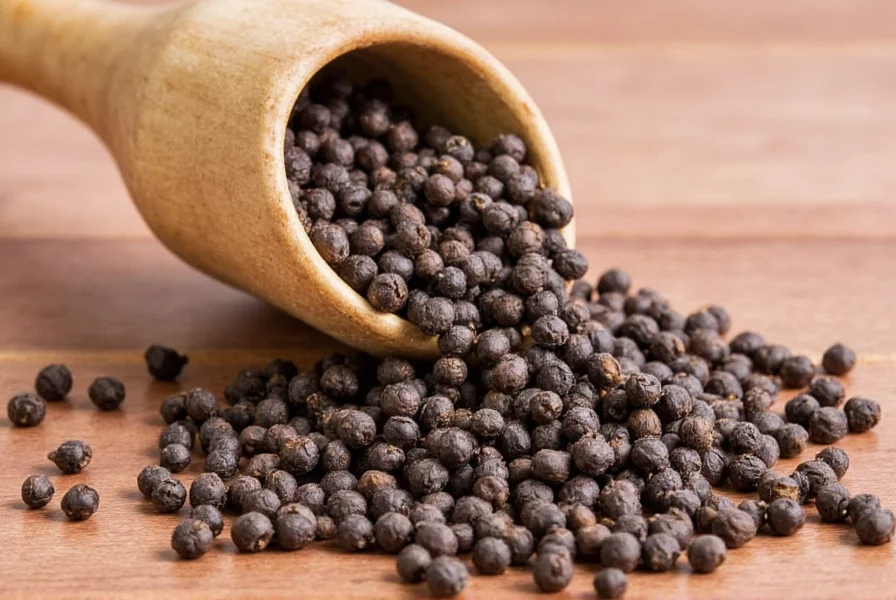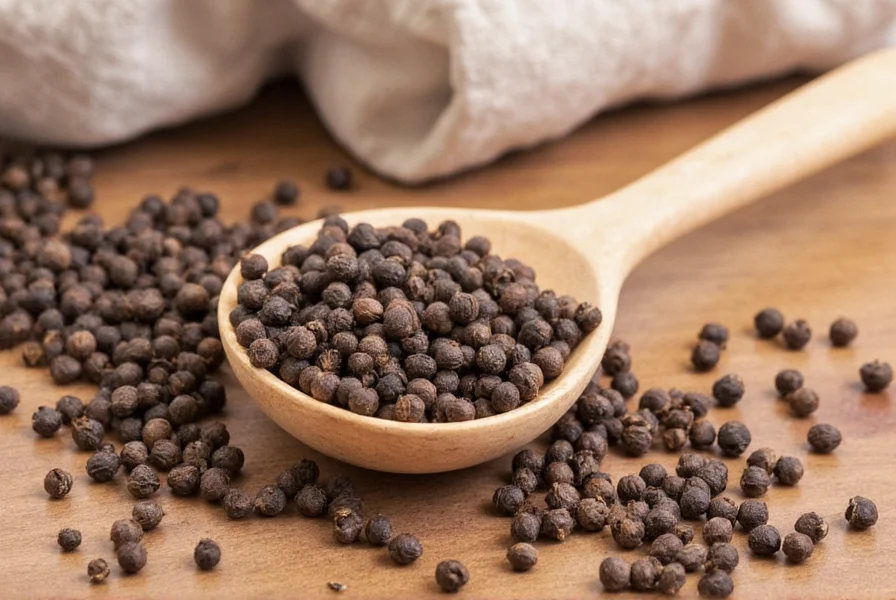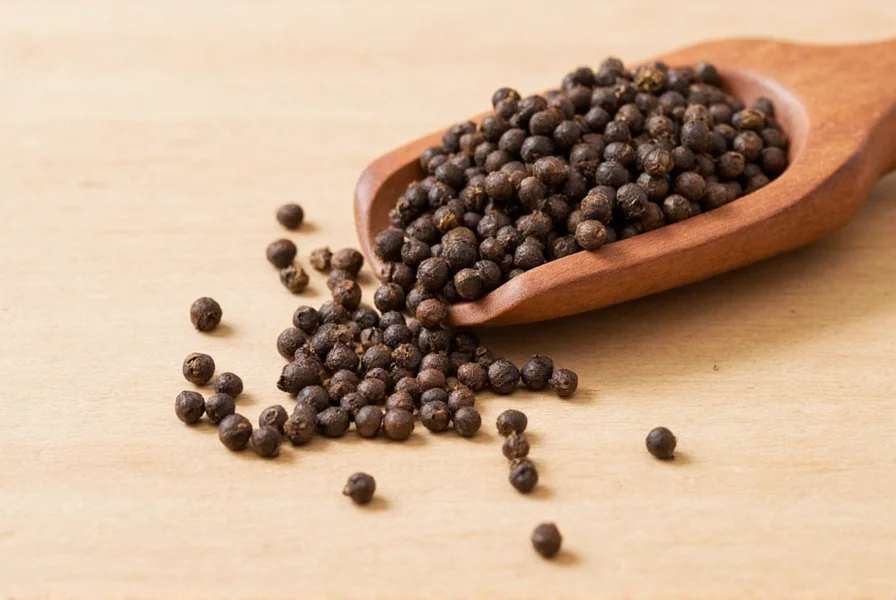Black pepper doesn't technically spoil or become unsafe to eat, but it gradually loses its flavor, aroma, and potency over time. Whole peppercorns maintain quality for 3-4 years when stored properly, while ground black pepper typically retains optimal flavor for 1-2 years. The key indicators that black pepper has degraded include diminished aroma, faded color, and lack of pungency when tasted.
Understanding the shelf life of your spices is essential for maintaining culinary quality in your kitchen. While black pepper won't make you sick when old, using degraded pepper can significantly impact the flavor profile of your dishes. This comprehensive guide explains everything you need to know about black pepper longevity, storage best practices, and how to maximize the shelf life of this kitchen staple.
How Black Pepper Degrades Over Time
Unlike perishable foods that develop harmful bacteria, black pepper experiences quality degradation rather than spoilage. The primary compound responsible for black pepper's distinctive heat and flavor is piperine, which gradually breaks down when exposed to environmental factors. As piperine degrades, your pepper loses its characteristic kick and complex flavor notes.
Whole peppercorns maintain their quality significantly longer than pre-ground pepper because the protective outer layer remains intact, slowing the oxidation process. Once ground, the increased surface area exposes more of the volatile compounds to air, accelerating flavor loss.
Signs Your Black Pepper Has Lost Quality
While black pepper remains safe indefinitely, these indicators show it's past its prime:
- Diminished aroma - Fresh black pepper has a sharp, complex scent. If you barely detect any fragrance when opening the container, the flavor has likely faded
- Color changes - Whole peppercorns should be dark brown to black. Significant fading toward gray indicates age
- Lack of heat - If your pepper no longer creates that characteristic tingling sensation when tasted
- Clumping - Ground pepper that forms hard clumps may have absorbed moisture, potentially leading to mold (discard if this occurs)
| Black Pepper Form | Best Quality Period | Maximum Safe Storage | Storage Recommendation |
|---|---|---|---|
| Whole peppercorns (unopened) | 3-4 years | Indefinitely | Airtight container in cool, dark place |
| Whole peppercorns (opened) | 2-3 years | Indefinitely | Grind as needed; minimize air exposure |
| Ground black pepper (unopened) | 2-3 years | 3-4 years | Original container until opened |
| Ground black pepper (opened) | 1-2 years | 2-3 years | Transfer to airtight container immediately |
Factors That Accelerate Black Pepper Degradation
Several environmental factors dramatically shorten black pepper's shelf life:
Moisture Exposure
Humidity is the primary enemy of spice longevity. Moisture causes clumping in ground pepper and can potentially lead to mold growth. Always use dry utensils when handling pepper, and never store it above the stove or near the sink where steam accumulates.
Light Exposure
UV rays break down the volatile compounds in black pepper. Clear glass containers may look attractive but significantly reduce shelf life compared to opaque or dark-colored containers.
Temperature Fluctuations
Consistent cool temperatures preserve spice quality. Avoid storing black pepper near heat sources like ovens or in areas with significant temperature swings.
Air Exposure
Oxygen causes oxidation, which degrades flavor compounds. The more frequently you open your container and the longer it remains open, the faster your pepper loses quality.
Optimal Storage Methods for Maximum Shelf Life
Implement these storage techniques to extend your black pepper's flavor longevity:
For Whole Peppercorns
Store in an airtight glass or metal container away from light. Consider buying whole peppercorns and grinding them as needed using a pepper mill. This approach delivers significantly better flavor than pre-ground pepper that's been sitting on shelves.

For Ground Black Pepper
Transfer opened ground pepper to an opaque, airtight container immediately. If using the original shaker, place it inside a resealable plastic bag for added protection against moisture and air.
Refrigeration and Freezing
While not necessary for safety, freezing whole peppercorns can extend their peak quality period. Place them in an airtight container or heavy-duty freezer bag, removing as much air as possible. Frozen peppercorns can be ground directly from frozen without thawing.
Using Older Black Pepper: Safety and Quality Considerations
From a food safety perspective, properly stored black pepper remains safe to consume indefinitely. The primary concern with older pepper is diminished flavor rather than health risks. However, if you notice any of these issues, discard the pepper immediately:
- Visible mold growth
- Unusual odors (sour, musty, or chemical-like)
- Signs of insect infestation
- Wet or clumped texture that doesn't break apart
When using older pepper, you may need to use larger quantities to achieve the desired flavor impact. However, extremely old pepper might develop off-flavors that could negatively affect your dishes.
Maximizing Flavor in Your Cooking
For the best culinary results, follow these professional tips:
- Grind pepper directly into dishes during the final stages of cooking to preserve volatile compounds
- Store multiple small containers rather than one large one to minimize air exposure
- Buy black pepper in smaller quantities that you'll use within 6-12 months
- Consider specialty peppers like Tellicherry for enhanced flavor profiles
- Toast whole peppercorns lightly before grinding to intensify flavors

When to Replace Your Black Pepper
While safety isn't a concern, replace your black pepper when:
- You can't detect a strong aroma when opening the container
- The flavor lacks complexity and heat when tasted
- You've had the same container for more than 2 years (ground) or 3 years (whole)
- The color has significantly faded from its original dark hue
Remember that properly stored whole peppercorns almost always deliver superior flavor compared to pre-ground alternatives, making them worth the minimal extra effort of grinding as needed.











 浙公网安备
33010002000092号
浙公网安备
33010002000092号 浙B2-20120091-4
浙B2-20120091-4